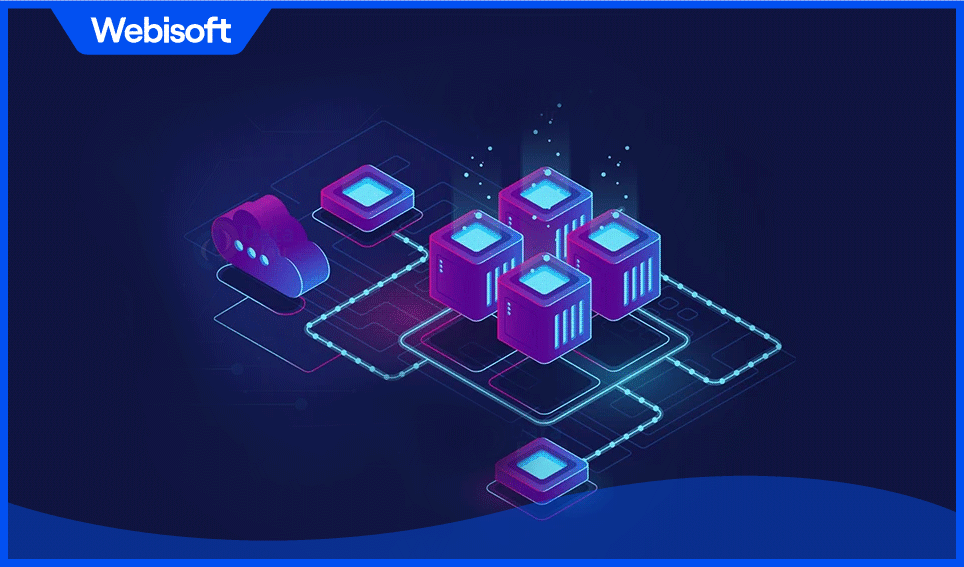A blockchain oracle is a system or service that provides external data to a blockchain network. In blockchain technology, smart contracts are self-executing contracts with the terms of the agreement directly written into code. However, smart contracts are typically isolated from the external world and cannot directly access data outside of the blockchain network.
This is where blockchain oracles come into play. They act as bridges between the blockchain and external data sources, enabling smart contracts to interact with real-world information or events. Oracles can fetch and verify data from various sources, such as APIs, web services, sensors, or even other blockchains. Once the data is retrieved, the oracle feeds it into the blockchain, making it accessible to smart contracts.
Blockchain oracles play a crucial role in enabling decentralized applications (DApps) and smart contracts to leverage external data, enabling a wide range of use cases. For example, oracles can provide real-time price feeds for cryptocurrencies, weather data for insurance contracts, sports scores for prediction markets, and much more.
Contents
- 1 The Classification of Blockchain Oracle
- 2 What is the Blockchain Oracle Problem?
- 3 How Does Blockchain Oracle Work?
- 4 Introducing Webisoft: Your Solution for Oracle Problem
- 4.1 Key Services Provided by Webisoft
- 4.1.1 Blockchain Development
- 4.1.2 Smart Contract Development
- 4.1.3 Decentralized Application (DApp) Development
- 4.1.4 Blockchain Integration
- 4.1.5 Oracle Solutions
- 4.1.6 Ideation and Consulting
- 4.1.7 Tokenization and ICO/STO Development
- 4.1.8 Blockchain Auditing and Security
- 4.1.9 Training and Workshops
- 4.1.10 Ongoing Support and Maintenance
- 4.1 Key Services Provided by Webisoft
- 5 How Webisoft Overcomes the Blockchain Oracle Issue
- 6 Final Thoughts
The Classification of Blockchain Oracle
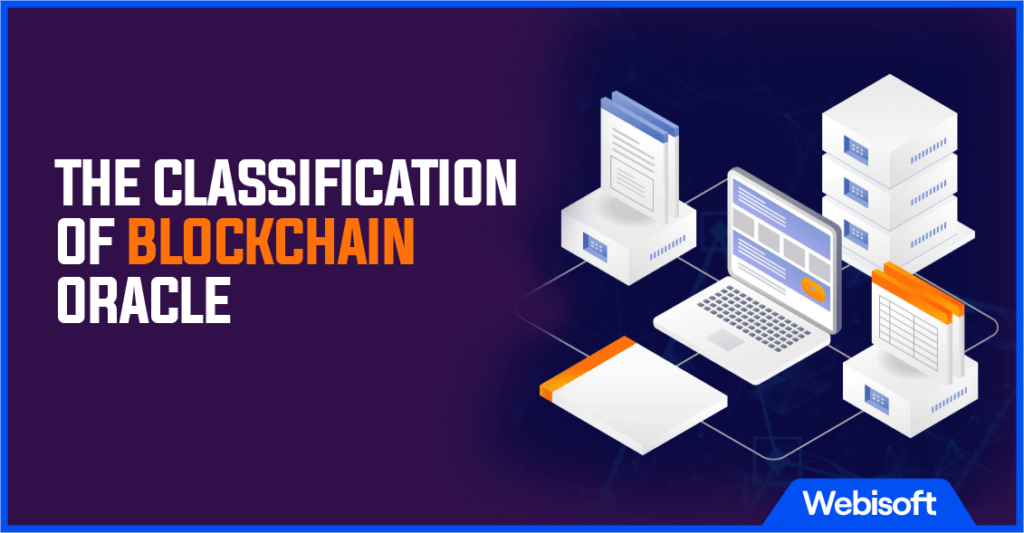
Blockchain oracles can be classified based on several factors, including their functionality, data source, and trust model. Here are the common classifications of blockchain oracles:
1. Functionality-based Classification:
a. Inbound Oracles: These oracles provide external data to the blockchain network. They fetch and verify data from external sources and make it available to smart contracts. Inbound oracles are commonly used to provide real-world data like prices, weather conditions, and events.
b. Outbound Oracles: These oracles enable smart contracts to trigger actions or interact with external systems. They can send data or instructions from the blockchain to external systems. Outbound oracles are often utilized for executing transactions or interacting with other networks.
2. Data Source-based Classification:
a. Software Oracles: These oracles retrieve data from online sources like APIs, web services, databases, or other software-based systems. They can fetch data such as financial information, market data, or any other digital information.
b. Hardware Oracles: These oracles connect to physical devices or sensors to collect data from the physical world. They can provide information about temperature, location, supply chain tracking, and other real-time data.
3. Trust Model-based Classification:
a. Centralized Oracles: These oracles rely on a single centralized entity or authority to provide data. While they offer convenience and simplicity, they introduce a central point of failure and potential vulnerabilities.
b. Decentralized Oracles: These oracles leverage decentralized networks or consensus mechanisms to provide data. They often involve multiple independent oracles, data aggregators, or validation mechanisms to ensure data integrity and minimize manipulation risks.
4. Reputation-based Classification:
a. Anonymous Oracles: These oracles operate without revealing the identity of the data provider. The focus is on privacy and anonymity, but it may introduce challenges in establishing trust and accountability.
b. Identity-based Oracles: These oracles require data providers to establish their identities, which can enhance trust and accountability. The reputation and credibility of data providers can be evaluated based on their identities and past performance.
It’s important to note that these classifications are not mutually exclusive, and different Oracle implementations can exhibit characteristics from multiple categories. The choice of oracle type depends on the specific requirements of the blockchain application, the level of trust and security needed, and the nature of the data being accessed.
What is the Blockchain Oracle Problem?
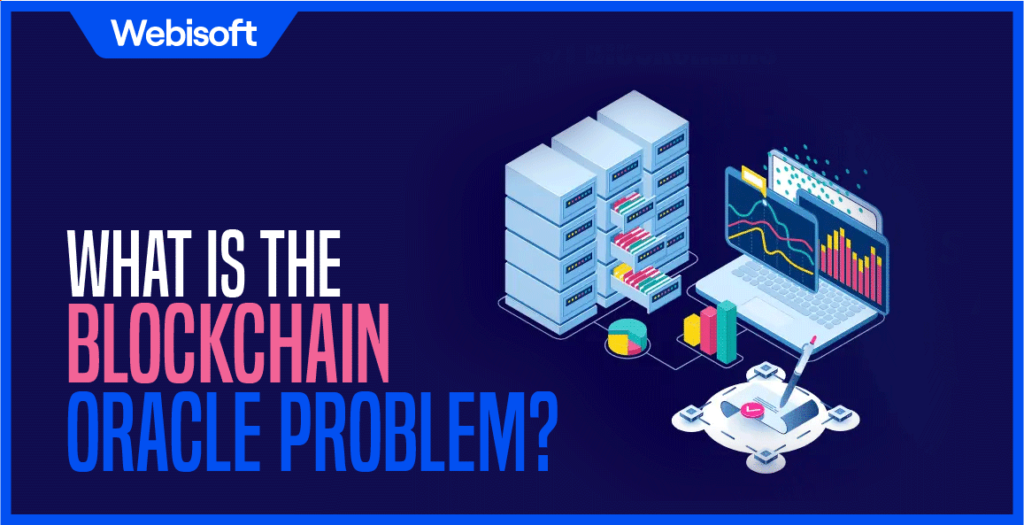
The blockchain oracle problem refers to the challenges and potential risks associated with obtaining reliable and accurate data from external sources and integrating it into a blockchain network. These problems include:
Trust and Security
Blockchain oracles introduce a trust dependency on external data sources. The integrity and accuracy of the data fetched by oracles are crucial for the proper functioning of smart contracts. If the data source or the oracle itself is compromised or provides incorrect data, it can lead to incorrect execution of smart contracts, financial losses, or other undesirable outcomes.
Data Authenticity
Verifying the authenticity of external data is a significant challenge for blockchain oracles. The data obtained from external sources may need to be validated to ensure it has not been tampered with or manipulated. Without proper validation mechanisms, malicious actors may attempt to manipulate the data to exploit smart contracts.
Single Point of Failure
Centralized oracles that rely on a single entity or centralized infrastructure create a single point of failure. If the centralized oracle fails or becomes compromised, it can disrupt the flow of data to the blockchain network, potentially halting or delaying the execution of smart contracts.
Privacy and Confidentiality
Oracles often require access to sensitive data, raising concerns about privacy and confidentiality. When interacting with external systems or data sources, measures must be in place to protect the privacy of user information and prevent unauthorized access to sensitive data.
Scalability and Performance
Fetching and processing large volumes of data from external sources can introduce scalability and performance challenges. As blockchain networks grow and require real-time or frequent data updates, the Oracle infrastructure needs to be robust enough to handle the increasing demands without compromising the overall network performance.
Cost and Maintenance
Implementing and maintaining a reliable blockchain oracle infrastructure can be costly and resource-intensive. The need for continuous monitoring, data verification, and updating the Oracle mechanisms can add to the operational expenses of a blockchain network.
Addressing the blockchain Oracle problem requires careful design considerations, the use of secure and reputable Oracle solutions, data validation techniques, multi-oracle approaches, reputation systems, cryptographic proofs, and ongoing security audits. The goal is to ensure the reliability, accuracy, and integrity of the data provided by oracles to maintain the trustworthiness of blockchain-based applications and smart contracts.
How Does Blockchain Oracle Work?
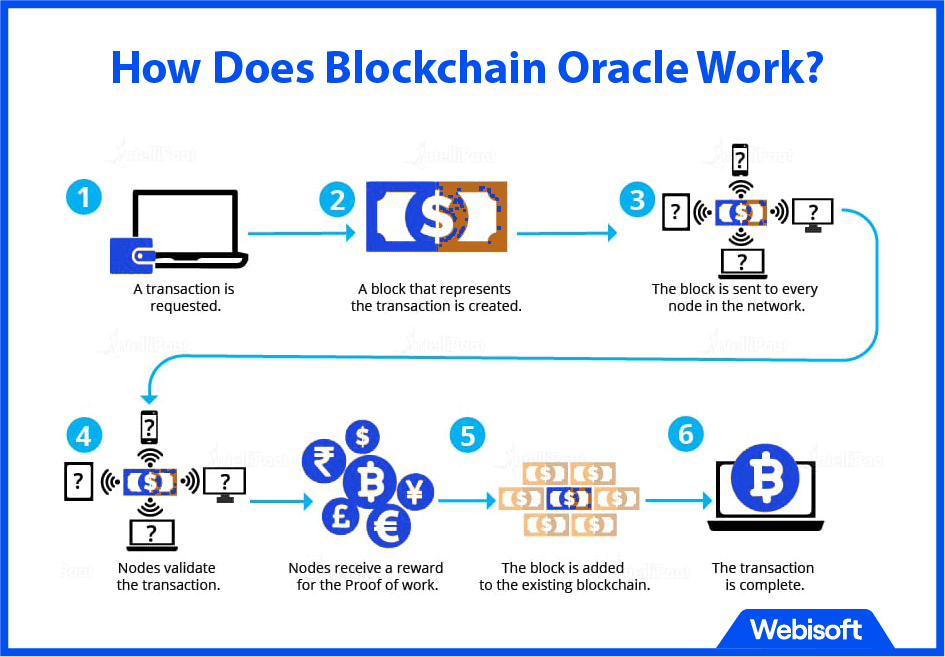
Blockchain oracles act as intermediaries between blockchain networks and external data sources, enabling the exchange of information. Here’s a general overview of how blockchain oracles work:
1. Data Request: A smart contract within the blockchain network requires access to external data to execute a particular function or condition. This data could be real-time market prices, weather conditions, game outcomes, or any other information not available within the blockchain.
2. Oracle Query: The smart contract sends a request or query to the oracle, specifying the required data and the source from which it needs to be fetched. The query may also include parameters or conditions for data retrieval.
3. Data Retrieval: The oracle fetches the requested data from the specified external source. This can involve accessing APIs, databases, sensors, or any other relevant data sources. The oracle validates and verifies the data to ensure its integrity and authenticity
4. Data Transmission: Once the data is retrieved and validated, the oracle transmits it back to the smart contract on the blockchain network. The data is usually packaged within a transaction or an event that can be processed by the smart contract.
5. Smart Contract Execution: The smart contract receives the data from the oracle and executes the necessary logic or conditions based on the retrieved information. The contract can now make decisions, trigger actions, or update its state based on the external data received.
It’s important to note that different types of oracles may follow distinct implementation approaches. For example, decentralized oracles may employ consensus mechanisms, multiple oracles, or data aggregators to ensure the accuracy of the data. The specific implementation details can vary based on the blockchain platform, the Oracle provider, and the complexity of the data retrieval process.
Introducing Webisoft: Your Solution for Oracle Problem
Webisoft is a leading software development company specializing in blockchain solutions. They focus on solving the blockchain oracle problem, which is a crucial challenge in the industry. By developing robust Oracle solutions, Webisoft enhances the trustworthiness and integrity of data inputs, revolutionizing how smart contracts interact with the external world.
Webisoft’s approach involves meticulous research, advanced algorithms, and innovative methodologies to ensure the accuracy, real-time availability, and security of external data. They offer comprehensive blockchain development services, including ideation, smart contract development, DApp development, and blockchain integration. With expertise in various platforms and programming languages, Webisoft delivers customized solutions that align with clients’ needs.
With a commitment to understanding clients’ businesses and goals, Webisoft develops tailored blockchain solutions that drive tangible value. By partnering with them your business can gain a trusted technology partner dedicated to unlocking the transformative potential of blockchain. As a reliable and innovative force, Webisoft empowers businesses to navigate the decentralized world with confidence and efficiency, reshaping industries and revolutionizing processes.
Key Services Provided by Webisoft
With their deep expertise and experience in the field, Webisoft offers a range of key services to help businesses harness the power of blockchain technology and drive innovation. Let’s have a look at all of them.
Blockchain Development
Webisoft offers end-to-end blockchain development services, covering all stages of the development lifecycle. Their expertise spans various blockchain platforms, including Ethereum, Hyperledger, and Corda.
Smart Contract Development
Webisoft specializes in developing smart contracts, which are self-executing contracts with predefined conditions. Their team proficiently works with programming languages like Solidity and Vyper to implement complex business logic within decentralized applications.
Decentralized Application (DApp) Development
Webisoft helps businesses build decentralized applications that leverage blockchain technology. They create user-friendly and secure DApps, enabling organizations to harness the benefits of decentralization in their operations.
Blockchain Integration
Webisoft assists businesses in integrating blockchain technology into existing systems and applications. They ensure seamless connectivity between blockchain networks and traditional infrastructure, enabling efficient data exchange and interoperability.
Oracle Solutions
Webisoft addresses the blockchain oracle problem by developing reliable and secure oracle solutions. These solutions act as bridges between on-chain and off-chain data sources, ensuring accurate and trustworthy data inputs into smart contracts.
Ideation and Consulting
Webisoft offers ideation and consulting services to help businesses explore the potential of blockchain technology. Their experts provide strategic guidance, feasibility assessments, and roadmap development, enabling clients to make informed decisions regarding blockchain adoption.
Tokenization and ICO/STO Development
Webisoft assists businesses in tokenizing assets and launching Initial Coin Offerings (ICOs) or Security Token Offerings (STOs). They guide clients through the entire process, from token creation to regulatory compliance and investor relations.
Blockchain Auditing and Security
Webisoft conducts comprehensive audits of blockchain systems to identify vulnerabilities and ensure robust security. They employ industry best practices and security standards to safeguard client assets and data.
Training and Workshops
Webisoft offers training programs and workshops to educate businesses about blockchain technology. They help organizations understand the potential use cases, benefits, and implementation strategies to foster blockchain adoption within their operations.
Ongoing Support and Maintenance
Webisoft provides continuous support and maintenance services to ensure the smooth operation of blockchain solutions. They offer bug fixing, system upgrades, and technical assistance to address any issues that may arise.
By offering these key services, Webisoft empowers businesses to leverage blockchain technology, enhance security, streamline processes, and unlock new opportunities for growth and innovation.
How Webisoft Overcomes the Blockchain Oracle Issue
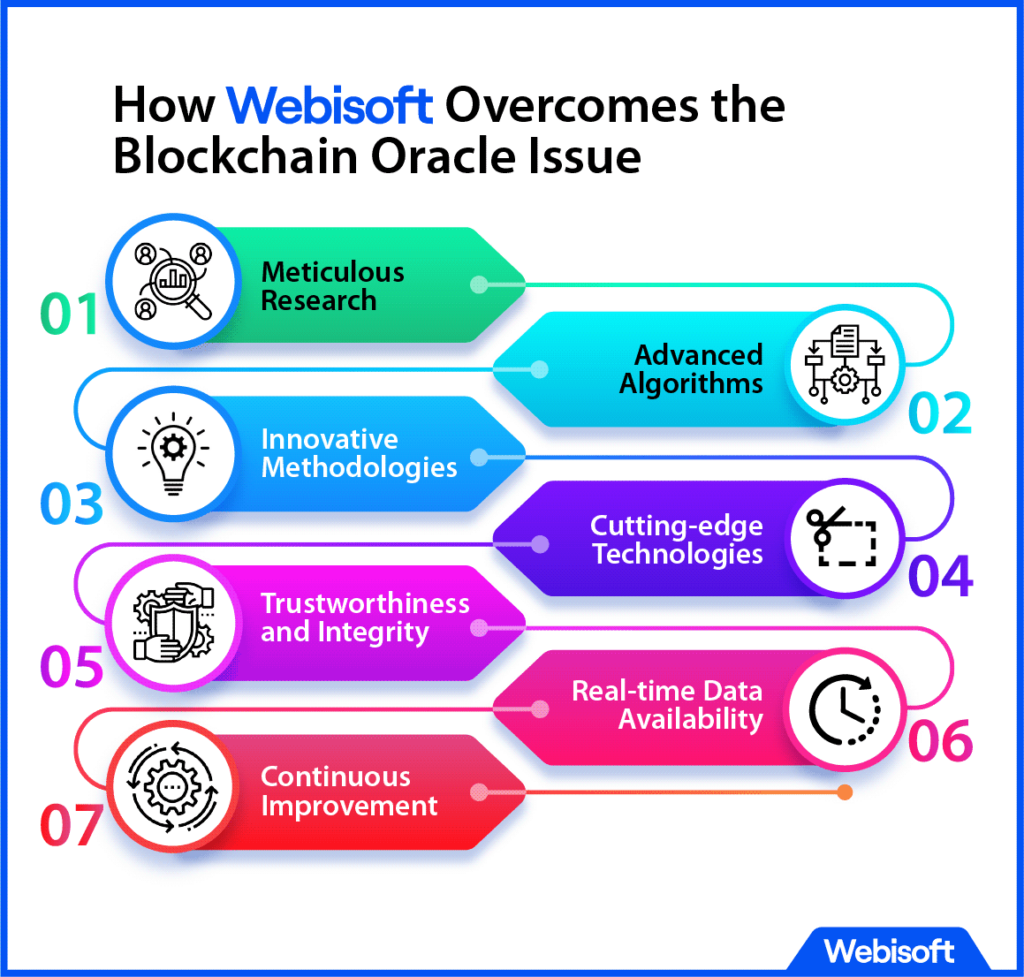
At the core of Webisoft’s services is their ability to develop robust and tailored blockchain solutions. They guide businesses through the entire blockchain development lifecycle, starting from the ideation phase to the design and architecture of blockchain networks.
Whether it’s building smart contracts, developing decentralized applications (DApps), or integrating existing systems with blockchain technology, Webisoft has the proficiency to deliver customized solutions that align with clients’ specific requirements.
Here’s how Webisoft Overcomes the Blockchain Oracle Issue:
Meticulous Research
Webisoft conducts thorough research to understand the intricacies and challenges associated with the blockchain oracle problem. They stay updated with the latest developments and advancements in the field to ensure their solutions align with industry best practices.
Advanced Algorithms
Webisoft leverages advanced algorithms to develop robust oracle solutions. These algorithms are designed to ensure the accuracy, reliability, and real-time availability of external data, mitigating the risks associated with incorrect or manipulated inputs.
Innovative Methodologies
Webisoft employs innovative methodologies to address the blockchain oracle problem. They focus on creating oracle solutions that prioritize security, privacy, and resistance to manipulation, ensuring the integrity of data inputs into smart contracts.
Cutting-edge Technologies
Webisoft harnesses cutting-edge technologies to overcome the challenges posed by the blockchain oracle problem. By utilizing the latest tools and frameworks, they develop secure and efficient systems that facilitate the seamless exchange of data between on-chain and off-chain worlds.
Trustworthiness and Integrity
Webisoft places a strong emphasis on enhancing the trustworthiness and integrity of data inputs. Their solutions are designed to provide reliable and accurate information to smart contracts, minimizing the potential for fraud, manipulation, or inaccuracies in the execution of blockchain-based transactions.
Real-time Data Availability
Webisoft ensures real-time availability of external data by implementing solutions that enable swift and seamless integration of off-chain data sources with blockchain networks. This allows for timely and accurate execution of smart contracts based on real-world events and conditions.
Continuous Improvement
Webisoft is committed to continuously improving their oracle solutions. They actively seek feedback from clients and industry experts, iteratively enhancing their methodologies and algorithms to address emerging challenges and evolving industry standards.
By combining meticulous research, advanced algorithms, innovative methodologies, cutting-edge technologies, and a focus on trustworthiness and real-time data availability, Webisoft overcomes the blockchain oracle problem. Their solutions empower businesses to leverage the full potential of blockchain technology while ensuring the accuracy, reliability, and integrity of data inputs into smart contracts.
Final Thoughts
In conclusion, the blockchain oracle problem is a critical challenge that hinders the full potential of blockchain technology. The reliance on external data inputs for smart contracts creates the need for trustworthy and secure Oracle solutions. To solve the blockchain oracle problem, it is essential to focus on enhancing the trustworthiness and integrity of data inputs.
This can be achieved through the use of cutting-edge technologies, such as advanced algorithms and secure encryption methods.
Webisoft, a leading software development company, stands at the forefront of addressing the blockchain oracle problem. Their expertise in blockchain development enables them to develop robust and tailored Oracle solutions that ensure accurate, reliable, and secure data inputs for smart contracts.
As blockchain technology continues to disrupt industries and reshape business processes, solving the blockchain oracle problem becomes increasingly important. By implementing reliable and efficient Oracle solutions, businesses can unlock the full potential of decentralized applications and drive innovation.
With the right approach and the support of companies like Webisoft, the blockchain oracle problem can be overcome, opening up new possibilities for trustless and transparent transactions in the digital era.
